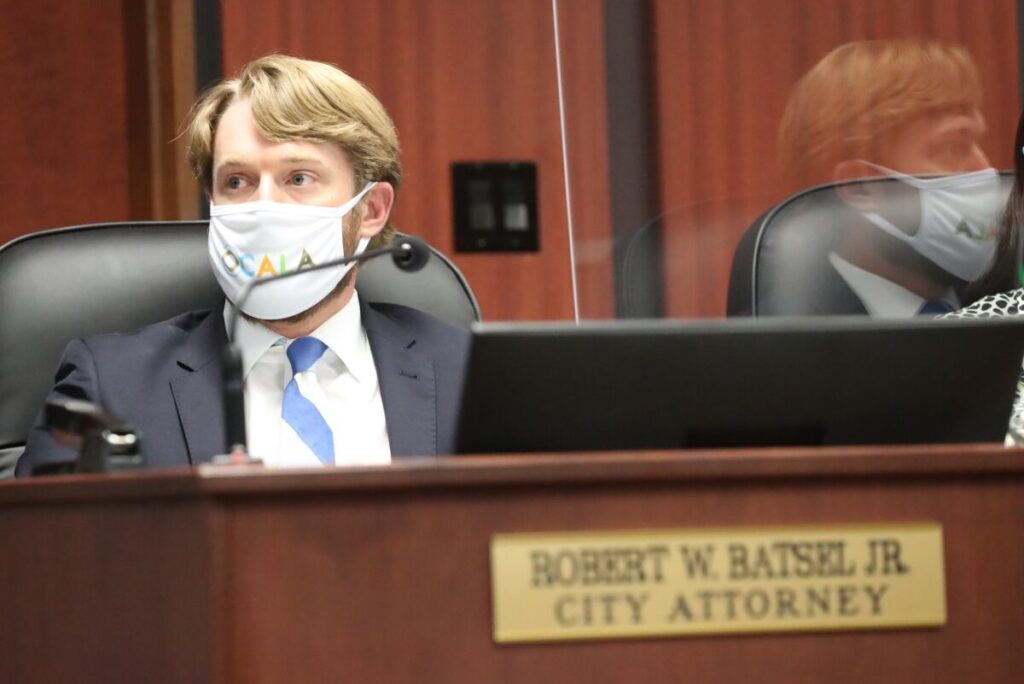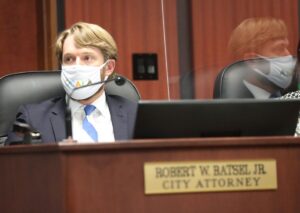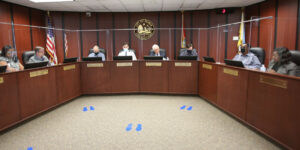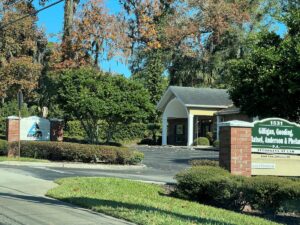Conflicts-of-interest questions surround city attorneys

City Attorney Robert Batsel Jr. speaks during an Ocala City Council meeting at Ocala City Hall in Ocala, Fla. on Tuesday, Dec. 15, 2020. [Bruce Ackerman/Ocala Gazette] 2020.
The law firm representing the City of Ocala for the last 30 years inserted a conflict-of-interest clause into its most current Oct. 2020 two-year contract that has gone unnoticed by the city council and city management until questions by the Ocala Gazette and the firm’s announcement that it was splitting their firm in two.
The reason for splitting the firm? Conflicts of interest had become harder to navigate.
Under the firm’s contract with the city, three attorneys from the firm of Gilligan, Gooding, Batsel, Anderson & Phelan, P.A., were “Chief Legal Advisor to the City, the City Council, the City Manager and all City departments, offices and agencies,” with the authority to delegate work to other associates of the firm.
The new conflict-of-interest clause said, in short, that the city attorney had advised the city, and the city is aware that the firm also represents “private persons and entities” that include “developers or contractors” who “have relationships with, or seek approvals from, [the] city.”
Patrick Gilligan, who had been the main city attorney contracted with the city since 1992, initially did not remember the conflict-of-interest clause when questioned by the Ocala Gazette but insisted that the “contract spoke for itself.”
Gilligan stated, “We follow the Florida Bar ethics rules on disclosure of conflicts, and so whatever is required under the particular circumstances by the Florida Bar is what we do.”
Jimmy Gooding, who has been the assistant city attorney for 26 years, originally told the Ocala Gazette he too did not remember the clause, but then, upon review, said that he remembered writing it.
“It was mainly just to formalize what we’d always done….I do not recall any particular event or thing that triggered it,” he said.
Robert Batsel Jr. joined the firm on June 1, 2017, and under the current contract was “main city attorney.”

City Attorney Robert Batsel Jr. speaks during an Ocala City Council meeting at Ocala City Hall in Ocala, Fla. on Tuesday, Dec. 15, 2020. [Bruce Ackerman/Ocala Gazette] 2020.
Batsel Jr. said that all their private clients know they represent the city, but that if city staff calls the firm about a project belonging to one of the firm’s private clients, they can remind city staff that the firm represents the private client “prior to giving advice.”
All three attorneys told the Ocala Gazette that they did not recollect discussing this conflict-of-interest clause with the city council or city management.
In response to inquiry by the Ocala Gazette, all the councilmen, except for Justin Grabelle who was unresponsive, indicated that they had no recollection of discussing this conflict-of-interest clause. Similarly, the city manager and two assistant city managers—who, at the time, ran operations for the procurement, engineering, and growth management departments that negotiate with developers and contractors most often—all told the Ocala Gazette that they were unaware of the conflict-of-interest clause.
All the councilmen, city management, and city staff knew that Gooding has a long history of representing developers within the county. The majority reasoned that when Gooding was dealing with developers for projects within the city that the city’s representation took priority–regardless of what he was doing for the same developer outside the city limits.

The Ocala City Council meets at Ocala City Hall in Ocala, Fla. on Tuesday, Dec. 15, 2020. [Bruce Ackerman/Ocala Gazette] 2020.
“I believe them to be ethical attorneys,” Musleh insisted.
When the most recent contract with the firm was approved at the city council meeting Oct. 20, 2020, congratulatory talk was exchanged between the attorneys, Batsel Jr. and Gilligan, while council listened on. Council remained silent–not asking even one question about the contract–and the attorneys gave no explanation of the significance of the new conflict-of-interest clause.
The contract was signed by council president at the time, Jay Musleh, and the three attorneys. The contract was attested to by the city clerk.
For this article, the Ocala Gazette has interviewed more than a dozen people, sometimes multiple times, to explore the mechanics of how the city attorneys and city staff navigate the conflicts of interest.
What are the Florida Bar rules about conflicts of interest?
Rule 4-1.7 of the Florida Bar Rules & Standards, related to professional conduct of lawyers, states that a lawyer must not represent a client if 1. The representation of one client will be directly adverse to another client; or 2. There is a substantial risk that the representation of one or more clients will be materially limited by the lawyer’s responsibilities to another client, a former client or a third person, or by a personal interest of the lawyer.
The exception to that rule is if the lawyer “reasonably believes that the lawyer will be able to provide competent and diligent representation to each affected client” and “each affected client gives informed consent, confirmed in writing or clearly stated on the record at a hearing.”
According to the rules, “informed consent” denotes the agreement by a person to a proposed course of conduct after the lawyer has communicated adequate information and explanation about the material risks of and reasonably available alternatives to the proposed course of conduct.
In the case of the city attorneys’ conflict-of-interest waiver, no specific clients were identified, only industries–development and contractors. No separate specific conflict memos could be identified by the attorneys or city staff.
The Ocala Gazette sought the opinion of Attorney Amanda Coffey, the chair of the City, County, & Local Government Law Section for the Florida Bar, to explain whether or not it would be important for attorneys to identify a specific client when communicating a possible conflict-of-interest.
Coffey expressed, “I can’t think of the instance where that [the client’s name] wouldn’t be necessary. It doesn’t mean there isn’t one. But generally, I believe you have to disclose to the other who the other client is in order for the conflict to be clear.”
“This specificity is important in getting the conflict waiver because it makes clear that your client understands what the potential conflicts in your representation might be. Without the specificity, I think it would be too big for them to make a clear and conscientious waiver of the conflict. So, an attorney would want to be as precise as they can,” continued Coffey, “As a general rule, you would get a waiver at each particular instance of representation.”
As to whose obligation it is to identify conflicts of interest and clearly communicate them, Coffey said, “The burden for the conflict waivers is on the attorney. This is the attorney’s ethical duty. It’s entirely on the attorney, the private clients that don’t have any duty to other clients of the attorney.”
Dividing jobs and ethical duties
During interviews with the three city attorneys, there was an attempt to delineate the duties and obligations they owed with Gilligan primarily focused on the city’s litigation matters, Gooding on land-use issues, and Batsel Jr. the day-to-day legal considerations of the city.
They also attempted to describe self-imposed barriers that would allow Gooding to represent developers such as the Roberts family, principals behind the latest big development–The World Equestrian Center (WEC) –while Batsel Jr. could approve contracts for the city that benefited the developer and draft or negotiate interlocal agreements between the city and county government that would benefit the development for water and sewer hookup.
With that particular conflict, Gooding said it was his understanding that Batsel Jr. communicated the conflict to the city.
“I’m pretty sure that Rob [Batsel Jr.] advised everybody at the city who he was dealing with, reminded them of it, and pointed out that because of my representation of what I was, I had nothing to do with it,” Gooding stated.
Gooding also explained that the firm has a special understanding with their private clients.
“We can withdraw from our representation of them and continue to represent the city. So, our private clients have always understood that we represent the city first. Now, that’s not because we favor the city over our other clients, but because we have a responsibility to the city as their essentially only attorneys. Whereas our private clients can go get other attorneys to represent them.”
When Gooding was asked why the city simply could not go get other attorneys to represent them, Gooding agreed the city could, “but it’s a lot of trouble for the city to do that. They have to find a lawyer, and then, they have to hire him and negotiate an agreement with him.”
The issue of whether or not it was proper for an attorney who represents a public body to represent a private client to that body, “even though the matter is not the subject of controversy and is outside the scope of the public attorney’s responsibilities,” was explored in Florida Bar Ethics Opinion 60-12. In that opinion, it was found improper even with “disclosure of facts and consent of the parties involved.”
In that same opinion, the question was asked, “Would the answer to the basic question be altered if it were assumed that the attorney for the public body is only one of several attorneys representing this body, each with delineated responsibilities, and his responsibilities do not fall in the area in which his partner or associate is requesting action on behalf of a private client?”
The answer stated, “In answer to this question, we do not feel that the fact that the public agency has several attorneys would alter our opinion in this connection, and we therefore consider that such representation would still be unethical.”
The other resolution and agreement approved on Oct. 20, 2020
At the same city council meeting where the firm’s contract was approved, Gooding offered resolution 2021-1, which was accepted unanimously by the council on the consent agenda.
In that resolution, developers seeking to hook up to water and sewer located outside the city limits could enter into an agreement Gooding had drafted for the city “with such revisions as are acceptable to the city attorney based upon its determination.”
These agreements only required the signature of the city council president and would not require approval by the city council.
City infrastructure, such as electric, water, and sewer, can be extended five miles outside the city limits to service developments in the county, according to the city engineer Sean Lanier.
Currently, there are 22 developments outside the city limits that are hooked up to city water.
Just three months after Gooding’s resolution is adopted by the city, one of Roberts’ developments, a mobile home park created for the purpose of housing staff who work at WEC, that is located in the county, signed the annex agreement to hook up to city water and wastewater services.
Gooding indicated that he had nothing to do with it other than admittedly creating the form for the city to use. The copy of the agreement was signed by then-city council president, Justin Grabelle, and approved by city attorney Batsel Jr.
At the bottom of the agreement, it stated, “Council Approval 10-20-2020,” yet only the fill-in-the-blank annexation agreement was prepared by Gooding and approved by the council on that date, without identifying specific developers.
As intended by the resolution passed on Oct. 20, 2020, the contract did not need to go before council until the property became contiguous to the city. Lanier said that sometimes there was no anticipation that the development would really be annexed into the city. In those cases, there would be nothing that would trigger the development agreement coming before city council.
Although not reflected in the agreement, Lanier said that the particular Roberts development had a “verbal agreement” with attorneys that the usual 25 percent surcharge the city charges developers to hook up to city would be waived. In line with that understanding, the city’s utilities service who handles the billing had not charged, a savings of more than $80,000 in impact fees to the developer.
A handful of other developments had signed the same annex agreement since the form had been approved by the city council, but they all were billed and paid the surcharge, confirmed Lanier.
Batsel, Jr. had no independent recollection of making a verbal agreement for waiving the 25% surcharge, and said he believes it was something Lanier negotiated. Batsel stated that the annex agreement would need to be readdressed since it was a mobile home park, and the city had expressly stated that it wants no more mobile home parks in the city limits.
Gooding said he did not know whether any of the other developers he currently worked with in the county were currently looking to hook up with the city’s services.
The director for growth management, Tye Chighizola, explained that according to the Marion County Comprehensive Plan that has been in place since 1985, “You’re not supposed to move forward with development if you don’t have concurrent development. So, if you don’t have water and sewer and everything then you can’t put up, you know, 3,000 or 10,000 houses out in the county – you had proved that there were services available.”
According to Chighizola, the city’s water and sewer infrastructure has been growing for over 100 years, whereas the areas of rural Marion County have been slower to get water and sewer connected. For some developments within the county, this makes hooking up to the city’s water and sewer an attractive solution.
In the summer of 2020, negotiations took place between the city and county for an interlocal government agreement to use city water and waste infrastructure to service WEC. The deal fell through, but Batsel Jr. said that he did work on draft agreement exchanged between the city and county.
The city manager, Sandra Wilson, indicated that she was unaware during those negotiations of Gooding’s representation of WEC.
City employees navigate conflicts of interest
The heads of the three departments who regularly negotiate with developers and contractors indicated they received no detailed written-conflict memos for signature.
Only procurement department head, Tiffany Kimball, produced emails and memos where a conflict had been recognized in 2019 over a bid on the Mary Sue Rich Center between the city and Ausley Construction, the principal of which is Ken Ausley-Gooding’s half-brother.
Notably, Ausley Construction was the construction company who won the $6 million contract to build the new Ocala airport terminal–with Gilligan, as the city attorney, signing approval for that contract.
The firm and construction company are next door to each other and share a road entryway and parking lot.
In that August 2019 bid conflict about the Mary Sue Rich Center, Ausley was represented by Robert Batsel Sr. –father of Batsel Jr. The senior Batsel joined his son at the firm in 2020.
Batsel Jr. and Gooding recommended to city procurement director, Kimball, that she hire attorney Dude Phelan to represent her office in the bid protest with Ausley Construction. Kimball ultimately decided to hire an out-of-town lawyer against the advice of Batsel Jr.
Following the settlement of the bid protest between the city and Ausley Construction, Gooding drafted a memo acknowledging the conflict of interest, but also negatively critiquing the performance the out-of-town attorney hired by the procurement department.
In the memo, Gooding indicated that the city “bungled the process” when, amongst other things, it “disregarded advice from the city attorney concerning [the] attorney to hire for bid protest.”
Phelan would also join the city’s attorney firm in 2020.
The city engineer Sean Lanier who frequently negotiates with developers on the city’s behalf for different agreements was unaware of the conflict-of-interest clause but thought it inconsequential in that, since he negotiates his own contracts, the firm’s involvement was only to memorialize the agreements for “form and legality.”
While Lanier noticed some of the developers he negotiated with were represented by the firm’s attorney for development issues before the Marion County Board of Commission, Lanier had noticed that attorney Fred Roberts would often end up representing the firm’s private clients for matters specifically related to the city.
Chighizola, who also frequently negotiates with developers and oversees every permit, development agreement, and building ordinance for the city responded similarly.
When asked what developers Chighizola knew Gooding had represented that may have business in the city, he rattled off some of the larger local developer names: Frank Stronach, John Rudnianyn, and Thad Boyd.
But Chighizola explained why he was not worried about the potential for conflict this way: “When we do development agreements, we kind of tell them what to put in there….We tell them, ‘This is what we’re gonna support, this is what we’re gonna do.’ And they [the attorneys] basically just write it, and then, we review it. So, it’s not like they’re driving the boat. We’re driving the boat, and, you know, they’re just drafting what we tell them to do.”
Chighizola seemed to have received the most verbal notifications from the firm that there could be a conflict, but understood that in those cases, the firm gave up the private client because the city’s representation took priority.
When Chighizola was asked to hypothetically identify what would cause concern over a potential conflict-of-interest with an attorney, he paused, then answered, “Maybe if he had represented them on a specific case in the past or something that’s very similar.”
But Chighizola maintained he felt that, when those cases have come up, the city’s representation priority has been with the firm–and the private client would be dropped.
Procurement director, Tiffany Kimball, who keeps track of the majority of the city’s contract and attempts to ensure fair and responsible bidding for the city, sends every contract the city enters to the city’s firm for approval.
When asked how she navigated those contracts where she knew the firm represented the business also on the other side of the transaction, she responded, “Sometimes, I’m unsure what to do. Sometimes, I don’t find out until after the fact. I just send them all the contracts to review because they are [the] city’s attorneys.”
When Kimball was asked how she detects conflicts of interest with the city’s firm, she could not recall a single time in her 11 years with the city in which the firm declined to review a city contract due to a conflict of interest.
“It’s the attorney’s duty to point out conflicts of interest,” she added.
The firm’s structure and financial interests
When Batsel Jr. was asked whether their representation of the city provided a special appeal to private development clients, he emphatically stated no, but added, “if you’re hiring me to represent you in a project located in the county, then yes, I think that you would value my knowledge of the county code and the permits necessary to do what you want to do. But that doesn’t mean that you hire me because I’m the city attorney. Because you know that I’m the city attorney and that I cannot and will not assist you with anything concerning the city.”
Over the past three months, the firm has been informing council members and city management of their split. Gooding stated that one of the reasons they were making the split was that their private clients had become increasingly frustrated with their limitations of representing them in the city.
Upon inquiry about the firm break, Batsel Jr. said, “I wouldn’t call it breaking up, but yes, we are all going to remain under one roof, but we will be two firms effective Jan. 1.”
“You know, everyone is on good, strong, wonderful terms and everything like that, so there’s nothing, you know, nothing to it in that respect. We’re all on the same page,” clarified Batsel Jr.
“Jimmy Gooding and my practice, of course, involves representation of the city, but in large part, our practice otherwise involves representation of private developers and we have a private land-use real estate practice. Historically, our clients have understood that we have a conflict in the city and they know that we represent the city first and foremost, and so we’ve never had a problem with that.”
Batsel Jr. acknowledged that things are changing.
“Whether it’s because of just the amount of work going on in the city right now, or otherwise, that conflict is becoming an increasing problem for our private clients. And at the same time, the representation of the city has grown so much just because the city is growing and evolving up, we had to pick one lane or another,” said Batsel Jr.
Pointing out that his private clients pay substantially more than the city’s hourly rate of $250 an hour, Gooding said, “It’s been an economic sacrifice for 20-something years [representing the city] and that’s not the reason that I am no longer wanting to represent the city. It’s just that the development activity is so heavy right now and the universe of land-use lawyers has gotten smaller. I feel like I need to be able to represent my private clients in front of the city.”
After Jan. 1st, Batsel Jr. said that Jimmy Gooding, Rob Batsel Sr., and Rob Batsel Jr. will make up one firm focused on their real estate land-use practice, “and the rest of the attorneys in our current firm will remain at another firm. And if they have an interest in representing the city beyond that point, wonderful, but Jimmy and I will no longer do city work after that point.”
The names of the attorneys who will make up the second firm under that roof are Patrick Gilligan, Dude Phelan, Chris Anderson, Gwen Williams, and Sydney Simmons.
Regardless of the firm’s split, all three city attorneys, Gilligan, Gooding, and Batsel Jr. indicated that they intend to serve out the rest of the contract through Nov.2022 when the city’s contract for legal services is up for renewal.





